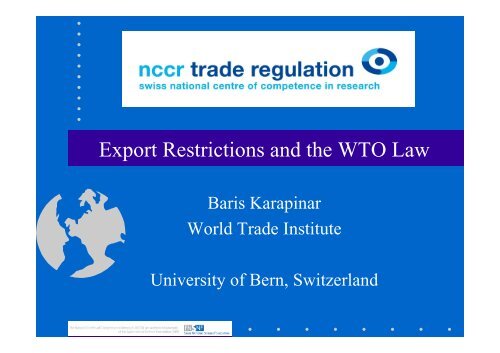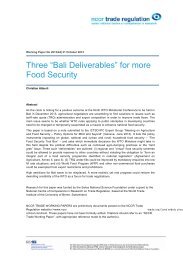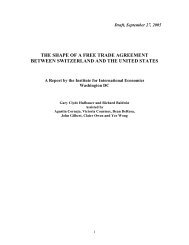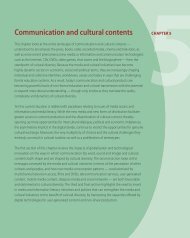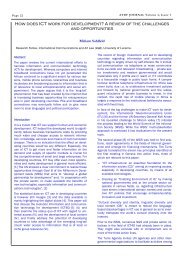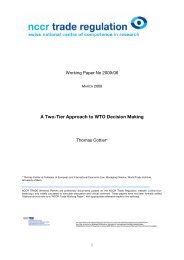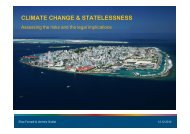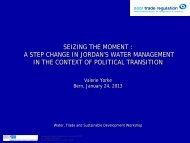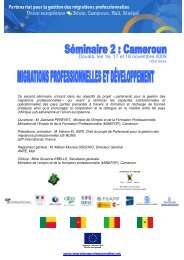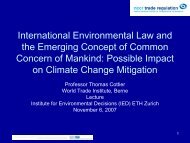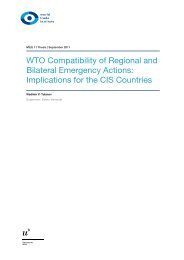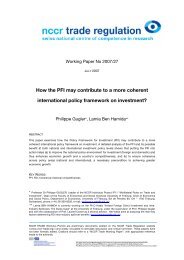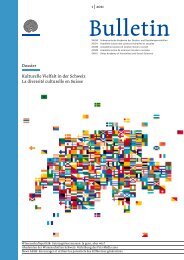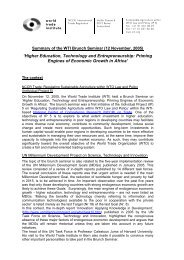Presentation slides, PDF - World Trade Institute
Presentation slides, PDF - World Trade Institute
Presentation slides, PDF - World Trade Institute
You also want an ePaper? Increase the reach of your titles
YUMPU automatically turns print PDFs into web optimized ePapers that Google loves.
Export Restrictions and the WTO Law<br />
Baris Karapinar<br />
<strong>World</strong> <strong>Trade</strong> <strong>Institute</strong><br />
University of Bern, Switzerland
NCCR<br />
International<br />
<strong>Trade</strong><br />
<strong>World</strong> <strong>Trade</strong> <strong>Institute</strong><br />
Joint Center of the Universities of<br />
Berne, Fribourg and Neuchâtel<br />
Hallerstrasse 6<br />
3012 Berne, Switzerland<br />
www.nccr-trade.org<br />
www.wti.org<br />
Tel. +41 31 631 30 80<br />
Fax +41 31 631 36 30<br />
nccr@wti.org<br />
Export restrictions in headlines<br />
• China’s restrictions of the exports of rare earth metals to<br />
Japan<br />
• Russia’s restrictions on wheat in August 2010<br />
• ‘Food crisis’ of 2007–2008 - dozens of countries imposed<br />
export restrictions<br />
• WTO Dispute Settlement, December 2009, United States<br />
(US), the European Union (EU) and Mexico vs China<br />
Export restrictions on selected raw materials
NCCR<br />
International<br />
<strong>Trade</strong><br />
<strong>World</strong> <strong>Trade</strong> <strong>Institute</strong><br />
Joint Center of the Universities of<br />
Berne, Fribourg and Neuchâtel<br />
Hallerstrasse 6<br />
3012 Berne, Switzerland<br />
www.nccr-trade.org<br />
www.wti.org<br />
Tel. +41 31 631 30 80<br />
Fax +41 31 631 36 30<br />
nccr@wti.org<br />
Outline<br />
• Economic, political, legal and environmental dimensions<br />
of export restrictions<br />
• Why do countries resort to export restrictions, potential<br />
implications for domestic and global welfare<br />
• WTO regulation<br />
• GATT/WTO cases and the ‘China- Raw Materials’ case<br />
• Environmental protection vs. disguised restriction on trade<br />
• Do we need stricter WTO regulation<br />
• WTO reform agenda
NCCR<br />
International<br />
<strong>Trade</strong><br />
<strong>World</strong> <strong>Trade</strong> <strong>Institute</strong><br />
Joint Center of the Universities of<br />
Berne, Fribourg and Neuchâtel<br />
Hallerstrasse 6<br />
3012 Berne, Switzerland<br />
www.nccr-trade.org<br />
www.wti.org<br />
Tel. +41 31 631 30 80<br />
Fax +41 31 631 36 30<br />
nccr@wti.org<br />
Policy Objectives<br />
• To maintain domestic food supplies<br />
• To promote downstream processors and manufacturers<br />
• Important source of government revenue (10 per cent of<br />
government revenue in Côte d’Ivoire)<br />
• Part of a fiscal regime (export taxes): flexibilities<br />
• Environmental protection (exhaustible natural resources<br />
including water, fisheries, forestry and minerals)<br />
• Prevent or slow down the depletion of natural resources,<br />
keep them for the benefit of future generations<br />
• High energy intensity of the production/processing of raw<br />
materials: cut emissions, promote energy efficiency
NCCR<br />
International<br />
<strong>Trade</strong><br />
<strong>World</strong> <strong>Trade</strong> <strong>Institute</strong><br />
Joint Center of the Universities of<br />
Berne, Fribourg and Neuchâtel<br />
Hallerstrasse 6<br />
3012 Berne, Switzerland<br />
www.nccr-trade.org<br />
www.wti.org<br />
Tel. +41 31 631 30 80<br />
Fax +41 31 631 36 30<br />
nccr@wti.org<br />
Welfare implications<br />
• Export restrictions result in welfare losses at the national<br />
and global levels<br />
• Potential impacts vary depending on the demand and<br />
supply elasticity of the commodity<br />
• Domestic consumers of the restricted product would<br />
benefit from lower than pre-export restriction prices (yet<br />
deadweight cost of market distortion)<br />
• At the global level, in the short run, supply restrictions<br />
push up the prices of the restricted commodity, consumer<br />
welfare will decrease while producer welfare will increase<br />
• Export restrictions unilaterally applied by one country may<br />
also lead to some trade diversion
NCCR<br />
International<br />
<strong>Trade</strong><br />
<strong>World</strong> <strong>Trade</strong> <strong>Institute</strong><br />
Joint Center of the Universities of<br />
Berne, Fribourg and Neuchâtel<br />
Hallerstrasse 6<br />
3012 Berne, Switzerland<br />
www.nccr-trade.org<br />
www.wti.org<br />
Tel. +41 31 631 30 80<br />
Fax +41 31 631 36 30<br />
nccr@wti.org<br />
Beyond pure economics<br />
• Export restrictions may help internalise some negative<br />
environmental externalities<br />
• Markets for environmental goods and services are not fully<br />
developed (market imperfections)<br />
• To what extent such policy interventions justify the<br />
welfare losses is a question of the social value of<br />
environmental goods<br />
• The effectiveness of the intervention: there could be<br />
significant discrepancies between the intended policy<br />
objectives and the actual impact on the ground<br />
• Alternative policy tools could be employed and be equally<br />
as effective or more so than export restrictions (and<br />
potentially less costly in terms of welfare losses)
NCCR<br />
International<br />
<strong>Trade</strong><br />
<strong>World</strong> <strong>Trade</strong> <strong>Institute</strong><br />
Joint Center of the Universities of<br />
Berne, Fribourg and Neuchâtel<br />
Hallerstrasse 6<br />
3012 Berne, Switzerland<br />
www.nccr-trade.org<br />
www.wti.org<br />
Tel. +41 31 631 30 80<br />
Fax +41 31 631 36 30<br />
nccr@wti.org<br />
Alternative tools<br />
(instead of or in conjunction with export restrictions)<br />
• Strong regulatory mechanism imposing strict standards of<br />
production and pollution control<br />
• Pollution charges directly applied to producers based on<br />
the amount of physical/chemical pollutants they discharge<br />
• Promoting and subsidising clean and efficient technologies<br />
• Liability insurance mechanisms covering potential<br />
environmental damage
NCCR<br />
International<br />
<strong>Trade</strong><br />
<strong>World</strong> <strong>Trade</strong> <strong>Institute</strong><br />
Joint Center of the Universities of<br />
Berne, Fribourg and Neuchâtel<br />
Hallerstrasse 6<br />
3012 Berne, Switzerland<br />
www.nccr-trade.org<br />
www.wti.org<br />
Tel. +41 31 631 30 80<br />
Fax +41 31 631 36 30<br />
nccr@wti.org<br />
WTO Regulation<br />
• WTO regulation is limited, offers ample ‘policy space’<br />
• GATT XI requires Members to eliminate all prohibitions<br />
and quantitative restrictions on exports<br />
• Exceptions: ‘temporarily’ to prevent food shortages; to<br />
allow time for the application of regulations such as<br />
classification and grading<br />
• Environmental protection, under Article XX.<br />
• Article 12 of the AoA mirrors GATT XI, requires<br />
Members to give a written notice to the Committee on<br />
Agriculture, and to consult with potentially affected<br />
Members<br />
• GATT XI does not restrict Members to imposing duties,<br />
taxes or other charges on exports (Members are allowed to<br />
impose export taxes)
NCCR<br />
International<br />
<strong>Trade</strong><br />
<strong>World</strong> <strong>Trade</strong> <strong>Institute</strong><br />
Joint Center of the Universities of<br />
Berne, Fribourg and Neuchâtel<br />
Hallerstrasse 6<br />
3012 Berne, Switzerland<br />
www.nccr-trade.org<br />
www.wti.org<br />
Tel. +41 31 631 30 80<br />
Fax +41 31 631 36 30<br />
nccr@wti.org<br />
WTO-plus<br />
• New WTO Members, such as China, Mongolia, Saudi<br />
Arabia, and Ukraine, were required to commit to stricter<br />
rules<br />
• They were obliged to phase out export taxes or to limit<br />
them to a designated number of tariff lines with a bound<br />
rate<br />
• Additional concessions that they had to make to become a<br />
Member of the WTO
NCCR<br />
International<br />
<strong>Trade</strong><br />
<strong>World</strong> <strong>Trade</strong> <strong>Institute</strong><br />
Joint Center of the Universities of<br />
Berne, Fribourg and Neuchâtel<br />
Hallerstrasse 6<br />
3012 Berne, Switzerland<br />
www.nccr-trade.org<br />
www.wti.org<br />
Tel. +41 31 631 30 80<br />
Fax +41 31 631 36 30<br />
nccr@wti.org<br />
GATT/WTO Disputes<br />
• ‘Japan – Semiconductors’ brought by EEC<br />
• Arrangement between Japan and the United States (US) on<br />
trade in semi-conductors<br />
• Japan prevented prices from going below a designated<br />
company-specific ‘fair value’<br />
• The Panel concluded that the administration structure was<br />
such that without being legally binding in form, it exerted<br />
various forms of pressure on the private sector to eliminate<br />
the sale of selected semi-conductors below companyspecific<br />
prices<br />
• Restricted their exports, hence violating Article XI
NCCR<br />
International<br />
<strong>Trade</strong><br />
<strong>World</strong> <strong>Trade</strong> <strong>Institute</strong><br />
Joint Center of the Universities of<br />
Berne, Fribourg and Neuchâtel<br />
Hallerstrasse 6<br />
3012 Berne, Switzerland<br />
www.nccr-trade.org<br />
www.wti.org<br />
Tel. +41 31 631 30 80<br />
Fax +41 31 631 36 30<br />
nccr@wti.org<br />
GATT/WTO Disputes<br />
• ‘Canada – Salmon’<br />
• Canada’s fishery legislation: ‘No person shall export from<br />
Canada any sockeye or pink salmon unless it is canned,<br />
salted, smoked, dried, pickled or frozen’<br />
• The US: violation of Article XI to promote the<br />
downstream processor sectors in Canada, at the expense of<br />
the processors in neighbouring areas in the US territory<br />
• Canada claimed that the measures were part of its fisheries<br />
conservation and management regime<br />
• Hence justified under Article XX(g), which allows for<br />
restrictive measures if they are ‘relating to’ the<br />
conservation of exhaustible natural resources
NCCR<br />
International<br />
<strong>Trade</strong><br />
<strong>World</strong> <strong>Trade</strong> <strong>Institute</strong><br />
Joint Center of the Universities of<br />
Berne, Fribourg and Neuchâtel<br />
Hallerstrasse 6<br />
3012 Berne, Switzerland<br />
www.nccr-trade.org<br />
www.wti.org<br />
Tel. +41 31 631 30 80<br />
Fax +41 31 631 36 30<br />
nccr@wti.org<br />
GATT/WTO Disputes<br />
• Panel examined the meaning of the terms ‘relating<br />
to’ and ‘in conjunction with’ as stated in Article<br />
XX(g)<br />
• For a trade measure to be considered as ‘relating<br />
to”, it had to be primarily aimed at conservation of<br />
exhaustible resources<br />
• <strong>Trade</strong> measure could only be considered to be ‘in<br />
conjunction with’ production or consumption<br />
restrictions if ‘it was primarily aimed at rendering<br />
effective these restrictions’
NCCR<br />
International<br />
<strong>Trade</strong><br />
<strong>World</strong> <strong>Trade</strong> <strong>Institute</strong><br />
Joint Center of the Universities of<br />
Berne, Fribourg and Neuchâtel<br />
Hallerstrasse 6<br />
3012 Berne, Switzerland<br />
www.nccr-trade.org<br />
www.wti.org<br />
Tel. +41 31 631 30 80<br />
Fax +41 31 631 36 30<br />
nccr@wti.org<br />
GATT/WTO Disputes<br />
• Panel found that the Canadian fishery regulation which<br />
restricted domestic production covered other fish varieties<br />
which were not subject to export prohibitions<br />
• The export prohibitions only applied to supplies in<br />
unprocessed form and did not cover exports of the same<br />
varieties in general<br />
• The measures restricted purchases of these commodities<br />
only by foreign processors and consumers and not those<br />
made by domestic processors and consumers<br />
• It concluded that ‘these prohibitions could not be deemed<br />
to be primarily aimed at the conservation of salmon and<br />
herring stocks and at rendering effective the restrictions on<br />
the harvesting of these fish’.<br />
• Canada violated Article XI which could not be justified<br />
under Article XX(g)
NCCR<br />
International<br />
<strong>Trade</strong><br />
<strong>World</strong> <strong>Trade</strong> <strong>Institute</strong><br />
Joint Center of the Universities of<br />
Berne, Fribourg and Neuchâtel<br />
Hallerstrasse 6<br />
3012 Berne, Switzerland<br />
www.nccr-trade.org<br />
www.wti.org<br />
Tel. +41 31 631 30 80<br />
Fax +41 31 631 36 30<br />
nccr@wti.org<br />
GATT/WTO Disputes<br />
• The ‘Argentina – Hides and Leather’<br />
• EC consultations on Pakistan and India regarding some<br />
alleged export restrictions on raw hides and skins
NCCR<br />
International<br />
<strong>Trade</strong><br />
<strong>World</strong> <strong>Trade</strong> <strong>Institute</strong><br />
Joint Center of the Universities of<br />
Berne, Fribourg and Neuchâtel<br />
Hallerstrasse 6<br />
3012 Berne, Switzerland<br />
www.nccr-trade.org<br />
www.wti.org<br />
Tel. +41 31 631 30 80<br />
Fax +41 31 631 36 30<br />
nccr@wti.org<br />
China – Raw materials case<br />
• China – Measures Related to the Exportation of Various<br />
Raw Materials<br />
• Bauxite, coke, fluorspar, magnesium, manganese,<br />
phosphate (yellow phosphorus), silicon (metal and<br />
carbide), and zinc<br />
o China imposes quantitative restrictions (Article XI:1 of the<br />
GATT 1994 and the Accession Protocol)<br />
o China imposes export duties on the commodities in<br />
question (the Accession Protocol)<br />
o China resorts to other constraints through fees and<br />
excessive formalities (Article VIII)
NCCR<br />
International<br />
<strong>Trade</strong><br />
<strong>World</strong> <strong>Trade</strong> <strong>Institute</strong><br />
Joint Center of the Universities of<br />
Berne, Fribourg and Neuchâtel<br />
Hallerstrasse 6<br />
3012 Berne, Switzerland<br />
www.nccr-trade.org<br />
www.wti.org<br />
Tel. +41 31 631 30 80<br />
Fax +41 31 631 36 30<br />
nccr@wti.org<br />
China – Raw materials case<br />
Bauxite: electronic and consumer goods<br />
Fluorspar: steel production<br />
Phosphate: agricultural fertilisers<br />
Silicon: semiconductors<br />
Magnesium: packaging, transportation<br />
Manganese: steel production dry cell batteries<br />
Zinc: agriculture, chemical, paint industries
NCCR<br />
International<br />
<strong>Trade</strong><br />
<strong>World</strong> <strong>Trade</strong> <strong>Institute</strong><br />
Joint Center of the Universities of<br />
Berne, Fribourg and Neuchâtel<br />
Hallerstrasse 6<br />
3012 Berne, Switzerland<br />
www.nccr-trade.org<br />
www.wti.org<br />
Tel. +41 31 631 30 80<br />
Fax +41 31 631 36 30<br />
nccr@wti.org<br />
• Tariff Execution Plan 2010<br />
• 329 tariff lines (8-digit Harmonized System (HS))<br />
• Article 11.3 of the Accession Protocol, ‘China shall<br />
eliminate all taxes and charges applied to exports unless<br />
specifically provided for in Annex 6<br />
• Annex 6 lists a total of 84 tariff lines (8-digit HS), with<br />
maximum levels of export duties
NCCR<br />
International<br />
<strong>Trade</strong><br />
<strong>World</strong> <strong>Trade</strong> <strong>Institute</strong><br />
Joint Center of the Universities of<br />
Berne, Fribourg and Neuchâtel<br />
Hallerstrasse 6<br />
3012 Berne, Switzerland<br />
www.nccr-trade.org<br />
www.wti.org<br />
Tel. +41 31 631 30 80<br />
Fax +41 31 631 36 30<br />
nccr@wti.org<br />
Conservation of natural resources<br />
• China had to demonstrate that its measures satisfy certain<br />
exception(s) under Article XX<br />
• Satisfy the requirement of ‘relating to’ the conservation of<br />
natural resources (GATT Article XX, paragraph (g))<br />
• Measures operate ‘in conjunction with restrictions on<br />
domestic production or consumption,’ (‘even-handedness<br />
requirement’)<br />
• Demonstrate that its measures do not constitute ‘a<br />
disguised restriction on international trade’ ( ‘chapeau’ of<br />
Article XX)
NCCR<br />
International<br />
<strong>Trade</strong><br />
<strong>World</strong> <strong>Trade</strong> <strong>Institute</strong><br />
Joint Center of the Universities of<br />
Berne, Fribourg and Neuchâtel<br />
Hallerstrasse 6<br />
3012 Berne, Switzerland<br />
www.nccr-trade.org<br />
www.wti.org<br />
Tel. +41 31 631 30 80<br />
Fax +41 31 631 36 30<br />
nccr@wti.org<br />
Environmental Legislation<br />
• The Environmental Protection Law of China<br />
• Protection of minerals could be classified as environmental<br />
protection under domestic law<br />
• China’s Foreign <strong>Trade</strong> Law allows for export restrictions<br />
in order to protect the environment<br />
• Fragmented regulation:<br />
• The Mineral Resources Law requires mining enterprises to<br />
have a report on environmental protection measures<br />
• Law on Water and Soil Conservation requires mining<br />
enterprises to have a water/soil conservation programme<br />
• The Law of the Prevention and Control of Water Pollution
NCCR<br />
International<br />
<strong>Trade</strong><br />
<strong>World</strong> <strong>Trade</strong> <strong>Institute</strong><br />
Joint Center of the Universities of<br />
Berne, Fribourg and Neuchâtel<br />
Hallerstrasse 6<br />
3012 Berne, Switzerland<br />
www.nccr-trade.org<br />
www.wti.org<br />
Tel. +41 31 631 30 80<br />
Fax +41 31 631 36 30<br />
nccr@wti.org<br />
Resource Tax - Mineral-Specific Measures<br />
• Directly imposed on production of non-metal ores, crude<br />
oil, natural gas, coal, and solid salt<br />
• Depending on mineral and the location of production,<br />
different tax rates apply<br />
• Only fractional (e.g. amounts to 0.3% of the current price<br />
of manganese ore)<br />
• Based on production volume rather than price, its potential<br />
impact on the environment through curbing production is<br />
weak<br />
• Aluminium smelters are subject to electricity rationing<br />
• 18 magnesium plants were closed down in 2008<br />
• Zinc smelting projects must have a minimum capacity
NCCR<br />
International<br />
<strong>Trade</strong><br />
<strong>World</strong> <strong>Trade</strong> <strong>Institute</strong><br />
Joint Center of the Universities of<br />
Berne, Fribourg and Neuchâtel<br />
Hallerstrasse 6<br />
3012 Berne, Switzerland<br />
www.nccr-trade.org<br />
www.wti.org<br />
Tel. +41 31 631 30 80<br />
Fax +41 31 631 36 30<br />
nccr@wti.org<br />
Likely outcome<br />
• China’s measures are not part of its highly fragmented<br />
environmental regulation dealing with mineral production<br />
• The measures are not ‘fairly narrowly focused’<br />
• Not ‘in conjunction with restrictions on domestic<br />
production or consumption’ (the even-handedness<br />
requirement): Restrictions on exports, not on domestic<br />
production and consumption<br />
• Only applies to foreign consumers and not to domestic<br />
processors and consumers<br />
• Only on unprocessed goods not on processed goods<br />
• Restrictions on domestic production (resource tax), or<br />
specific environmental measures cover other natural<br />
resources which are not subject to export restrictions<br />
• Measures do not satisfy the even-handedness requirement
NCCR<br />
International<br />
<strong>Trade</strong><br />
<strong>World</strong> <strong>Trade</strong> <strong>Institute</strong><br />
Joint Center of the Universities of<br />
Berne, Fribourg and Neuchâtel<br />
Hallerstrasse 6<br />
3012 Berne, Switzerland<br />
www.nccr-trade.org<br />
www.wti.org<br />
Tel. +41 31 631 30 80<br />
Fax +41 31 631 36 30<br />
nccr@wti.org<br />
‘Unfair’ competition vs sustainability<br />
• GATT/WTO disputes involved alleged ‘unfair’ advantages<br />
• Competition over resources. More disputes over export<br />
restrictions coming before the DSB in post-crisis<br />
• Canada and China cases: environmental<br />
component/objective of the measures in question was<br />
relatively weak as compared to their economic<br />
component/objective with a restrictive impact on trade<br />
• A carefully measured export restriction policy in<br />
conjunction with other domestic measures limiting<br />
production and consumption could well help protect the<br />
environment
NCCR<br />
International<br />
<strong>Trade</strong><br />
<strong>World</strong> <strong>Trade</strong> <strong>Institute</strong><br />
Joint Center of the Universities of<br />
Berne, Fribourg and Neuchâtel<br />
Hallerstrasse 6<br />
3012 Berne, Switzerland<br />
www.nccr-trade.org<br />
www.wti.org<br />
Tel. +41 31 631 30 80<br />
Fax +41 31 631 36 30<br />
nccr@wti.org<br />
‘Unfair’ competition vs sustainability<br />
• Export restrictions could help developing countries raise<br />
tax revenues<br />
• Differentiated export tax on raw materials may help<br />
countries move up the value chain<br />
• Export taxes could contribute to the stability, efficiency<br />
and predictability of a fiscal regime<br />
• Levying carbon exports optimization tax could be one tool<br />
developing countries could use to counter or pre-empt<br />
border adjustment measures (BAMs)
NCCR<br />
International<br />
<strong>Trade</strong><br />
<strong>World</strong> <strong>Trade</strong> <strong>Institute</strong><br />
Joint Center of the Universities of<br />
Berne, Fribourg and Neuchâtel<br />
Hallerstrasse 6<br />
3012 Berne, Switzerland<br />
www.nccr-trade.org<br />
www.wti.org<br />
Tel. +41 31 631 30 80<br />
Fax +41 31 631 36 30<br />
nccr@wti.org<br />
Stricter Regulation<br />
• The WTO law, proposals to tighten the disciplines on<br />
export restrictions<br />
• Japan proposed to ‘tariffy’ all export prohibitions and<br />
restrictions, and to bind all export taxes<br />
• Proposals by Switzerland and Jordan: stricter - elimination<br />
of all export restrictions and the binding at zero of all<br />
export tariffs<br />
• New proposal by Japan and Switzerland: consultations<br />
between affected parties; establishment of ‘standing<br />
committee of experts’ for binding arbitration<br />
• Chile, Japan, Republic of Korea, and the United States,<br />
circulated a communication in the non-agricultural market<br />
access negotiations<br />
• Resistance from developing countries
NCCR<br />
International<br />
<strong>Trade</strong><br />
<strong>World</strong> <strong>Trade</strong> <strong>Institute</strong><br />
Joint Center of the Universities of<br />
Berne, Fribourg and Neuchâtel<br />
Hallerstrasse 6<br />
3012 Berne, Switzerland<br />
www.nccr-trade.org<br />
www.wti.org<br />
Tel. +41 31 631 30 80<br />
Fax +41 31 631 36 30<br />
nccr@wti.org<br />
‘differentiated’ reform agenda<br />
•(i) All forms of quantitative export restrictions should be<br />
‘tariffied’, and all export taxes should be subject to<br />
differentiated bound rates<br />
(Indicators of trade concentration and intensity - as<br />
objective criteria to set differentiated bound rates for<br />
commodity groups and countries)<br />
• (ii) Low income developing countries should be exempted<br />
from stricter regulation as long as they do not damage<br />
other low income countries;
NCCR<br />
International<br />
<strong>Trade</strong><br />
<strong>World</strong> <strong>Trade</strong> <strong>Institute</strong><br />
Joint Center of the Universities of<br />
Berne, Fribourg and Neuchâtel<br />
Hallerstrasse 6<br />
3012 Berne, Switzerland<br />
www.nccr-trade.org<br />
www.wti.org<br />
Tel. +41 31 631 30 80<br />
Fax +41 31 631 36 30<br />
nccr@wti.org<br />
‘differentiated’ reform agenda<br />
• (iii) Reform efforts should allow more flexibility for<br />
environmental considerations (e.g. revising the<br />
interpretation of Article XX)<br />
• (iV) Reform efforts should aim to improve the<br />
transparency and predictability of these measures (a<br />
Monitoring Committee could be established)<br />
• (v) Reform efforts should also include the establishment of<br />
a strong and responsive enforcement mechanism (an<br />
Expert Committee with arbitration capacity could be<br />
established)
NCCR<br />
International<br />
<strong>Trade</strong><br />
<strong>World</strong> <strong>Trade</strong> <strong>Institute</strong><br />
Joint Center of the Universities of<br />
Berne, Fribourg and Neuchâtel<br />
Hallerstrasse 6<br />
3012 Berne, Switzerland<br />
www.nccr-trade.org<br />
www.wti.org<br />
Tel. +41 31 631 30 80<br />
Fax +41 31 631 36 30<br />
nccr@wti.org<br />
Conclusions<br />
• ‘Under-regulation’ or ‘regulatory deficiency’ in WTO law<br />
• WTO law has been designed largely to promote exportdriven<br />
interests of leading Members<br />
• Restricting this unintentionally large ‘policy space’ is not<br />
only politically unfeasible but also undesirable for<br />
resource-rich developing countries<br />
• Given the limitations of taking unilateral and bilateral<br />
measures against export restrictions, reform of multilateral<br />
rules in this field is urgent.<br />
• A sufficiently ‘differentiated’ reform agenda on export<br />
restrictions could help maintain the stability of the<br />
multilateral trading system
NCCR<br />
International<br />
<strong>Trade</strong><br />
<strong>World</strong> <strong>Trade</strong> <strong>Institute</strong><br />
Joint Center of the Universities of<br />
Berne, Fribourg and Neuchâtel<br />
Hallerstrasse 6<br />
3012 Berne, Switzerland<br />
www.nccr-trade.org<br />
www.wti.org<br />
Tel. +41 31 631 30 80<br />
Fax +41 31 631 36 30<br />
nccr@wti.org<br />
Thank You!
NCCR<br />
International<br />
<strong>Trade</strong><br />
<strong>World</strong> <strong>Trade</strong> <strong>Institute</strong><br />
Joint Center of the Universities of<br />
Berne, Fribourg and Neuchâtel<br />
Hallerstrasse 6<br />
3012 Berne, Switzerland<br />
www.nccr-trade.org<br />
www.wti.org<br />
Tel. +41 31 631 30 80<br />
Fax +41 31 631 36 30<br />
nccr@wti.org<br />
Export restrictions in Africa<br />
Cameroon Logs exports of wood: export tax of 17.5%<br />
manganese<br />
Chad Chadian gum: 7.5 % Exports of heifers and calves have been<br />
banned since 2003<br />
Congo<br />
Quantitative restriction on rough<br />
timber: 15 % of its total production<br />
volume<br />
Ghana<br />
Hydrocarbons: US$0.09 per litre on<br />
aviation turbine kerosene; US$0.03 per<br />
litre on gas oil.<br />
Exports of round or unprocessed logs,<br />
raw rattan cane and bamboo are<br />
prohibited<br />
Guinea<br />
2 per cent all exports<br />
Gold in ingots: 5 per cent tax<br />
Diamonds: 5-10% (raw), 2% per cent (cut<br />
stones)
NCCR<br />
International<br />
<strong>Trade</strong><br />
<strong>World</strong> <strong>Trade</strong> <strong>Institute</strong><br />
Joint Center of the Universities of<br />
Berne, Fribourg and Neuchâtel<br />
Hallerstrasse 6<br />
3012 Berne, Switzerland<br />
www.nccr-trade.org<br />
www.wti.org<br />
Tel. +41 31 631 30 80<br />
Fax +41 31 631 36 30<br />
nccr@wti.org<br />
Export restrictions in Africa<br />
Nigeria<br />
Sierra<br />
Leone<br />
Export taxes apply to some agricultural<br />
products<br />
Artisanal mining: 3% export duty while<br />
Kimberlite mining has a 5% royalty fee<br />
and 0.5% valuation fee<br />
cocoa and coffee (2.5%), diamonds (3%).<br />
Export bans may cover raw hides and<br />
skins, timber (rough or sawn), scrap<br />
metals, unprocessed rubber latex and<br />
rubber lumps, rice, yams, maize<br />
Exports of plants and charcoal are<br />
restricted through permits<br />
Zambia 15% on copper concentrates and 20%<br />
cotton seed<br />
25% export duty on unprocessed timber<br />
Export prohibitions apply to certain<br />
types of logs under international<br />
agreements


